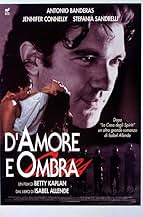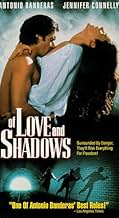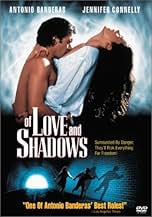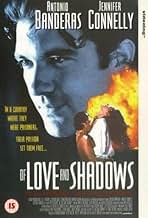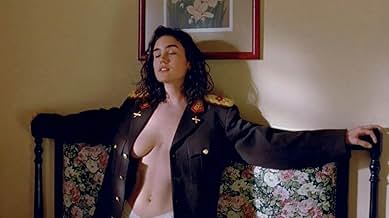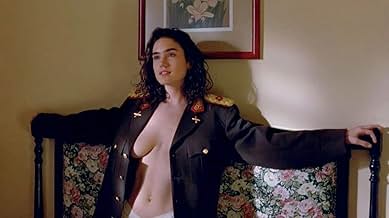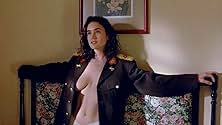NOTE IMDb
4,9/10
2,6 k
MA NOTE
Ajouter une intrigue dans votre langueChile 1973 is ruled by the dictator Pinochet. The wealthy don't see the violence, terror, executions etc. including Irene. She's engaged to an officer in the fascist military. She meets Fran... Tout lireChile 1973 is ruled by the dictator Pinochet. The wealthy don't see the violence, terror, executions etc. including Irene. She's engaged to an officer in the fascist military. She meets Francisco who opens her eyes to truth and love.Chile 1973 is ruled by the dictator Pinochet. The wealthy don't see the violence, terror, executions etc. including Irene. She's engaged to an officer in the fascist military. She meets Francisco who opens her eyes to truth and love.
- Réalisation
- Scénario
- Casting principal
- Récompenses
- 4 nominations au total
Jorge Rivera López
- Professor Leal
- (as Jorge Rivera Lopez)
Ángela Ragno
- Hilda Leal
- (as Angela Ragno)
Alfredo Martín
- Surgeon
- (as Alfredo Martin)
Ana Leza
- Evangelina
- (as Anita Lesa)
Darío Fernández
- Ministry Employee
- (as Dario Fernandez)
Avis à la une
This movie is not only bad but also downright annoying. Acting is weak and the characters are not convincing. You don't need to have lived in a Latin American country under dictatorship to notice the caricatural overplaying of roles. And it's not because the story is so obviously biased towards the leftist cause in Latin America (totally expected, being based on a book by Isabel Allende): Costa-Gavras was able to make good movies in spite of ideology. The funniest thing however is that the movie in reality, and unintentionally, ends up showing a face of Latin-American politics that is extremely depressing: the left and the right are both so empty-headed that not only you're incapable of feeling any sympathy for them, but even worse, it makes you believe that now you finally understood why Latin-American countries have so much trouble governing themselves. It's a really sad movie.
Irene (Jennifer Connelly) is a daughter of privilege in 1970's Chile. It is a time of government repression and citizens of Chile are turning up missing, never to be found. Working as a magazine writer, Irene meets photographer Francisco (Antonio Banderas). Francisco is a passionate young man with a dangerous secret: he is working for an underground movement investigating the government's actions. Although Irene is engaged to a man in the military, she falls in love with Francisco and joins him in his underground activities. Will they be able to expose the misdeeds of the government and remain alive?
This movie is based on a novel by Chilean-born author Isabel Allende. Her political views are to the left; yet, this film is not totally biased. Real events occured under Chilean leader Pinochet, who eventually was deposed. This movie, therefore, offers a glimpse into the horrific tortures and deaths at the hands of the Chilean government in the seventies. Not as exciting as it could be, the film nevertheless provides enough drama and pathos to touch the hearts of its viewers. Connelly and Banderas give fine performances that resonate. Recommended for fans of the two leads as well as those who admire films with a political agenda.
This movie is based on a novel by Chilean-born author Isabel Allende. Her political views are to the left; yet, this film is not totally biased. Real events occured under Chilean leader Pinochet, who eventually was deposed. This movie, therefore, offers a glimpse into the horrific tortures and deaths at the hands of the Chilean government in the seventies. Not as exciting as it could be, the film nevertheless provides enough drama and pathos to touch the hearts of its viewers. Connelly and Banderas give fine performances that resonate. Recommended for fans of the two leads as well as those who admire films with a political agenda.
6B24
But not much else. As a story, it is something of a docudrama -- part history and part love story. The historical part must be taken for granted, as the author maintains high credentials as a witness. The love story is just so-so, however -- predictable and depending for its attractiveness on a good deal of gratuitous nudity. We see here rather more of Antonio Banderas than is probably necessary. Ditto the Chilean army officer.
The main weakness of the film is that it is not presented in Spanish with English subtitles. To have Spanish-speaking actors mouthing English is extremely distracting, and to my mind unforgivable in view of the locale and the facts of its production. Jennifer could surely have been taught to fake a little Español with some artful dubbing later on.
Still, one has to appreciate the scenery and the score, played apparently by a full symphony orchestra somewhere in Bratislava or the like. As a travelogue it succeeds admirably, even if it is on the sunrise side of the Andes and not the other way round.
The main weakness of the film is that it is not presented in Spanish with English subtitles. To have Spanish-speaking actors mouthing English is extremely distracting, and to my mind unforgivable in view of the locale and the facts of its production. Jennifer could surely have been taught to fake a little Español with some artful dubbing later on.
Still, one has to appreciate the scenery and the score, played apparently by a full symphony orchestra somewhere in Bratislava or the like. As a travelogue it succeeds admirably, even if it is on the sunrise side of the Andes and not the other way round.
If you don't go by the poster of the movie(which portrayed it to be a passionate love story), you'd enjoy the movie.
I haven't read the novel and I was engrossed very quickly with what was shown in the movie. The year is 1973 and Chile has been taken over by military coup. An woman talks to Francesco(a phychiatrist) about the nightmares she is having after military has tortured her and her husband. Her voice breaks as she says "one after another..again and again" Irene (Connelly) belongs to the upper class, she is innocent, engaged to her cousin, a military captain since childhood. She also publishes a magazine. She employed Francesco(Banderas) who is now out of job as the photographer. Francesco and his family are totally against the human rights violation that occurs. His brother is a priest in church who tries to prevent things.
When the magazine crew went to interview Evangelina, a magical woman, military comes and interferes. Evangelina with superhuman strength picks up military commander Ramirez and throws him away. They left. Shortly after, Evangelina is taken by military and she has disappeared.
Irene and Francesco tried to find out where Evangelina is. In the process, their lives and others take a complete turn-oil. And expectedly they fall in love.
The scenes of military regime is very well depicted. The arrogance of their police, the fear among civilians are very real and touching. Of memorable scenes are Evangelina's friend in military who is torn between his job needs and the human ways.
I haven't read the novel and I was engrossed very quickly with what was shown in the movie. The year is 1973 and Chile has been taken over by military coup. An woman talks to Francesco(a phychiatrist) about the nightmares she is having after military has tortured her and her husband. Her voice breaks as she says "one after another..again and again" Irene (Connelly) belongs to the upper class, she is innocent, engaged to her cousin, a military captain since childhood. She also publishes a magazine. She employed Francesco(Banderas) who is now out of job as the photographer. Francesco and his family are totally against the human rights violation that occurs. His brother is a priest in church who tries to prevent things.
When the magazine crew went to interview Evangelina, a magical woman, military comes and interferes. Evangelina with superhuman strength picks up military commander Ramirez and throws him away. They left. Shortly after, Evangelina is taken by military and she has disappeared.
Irene and Francesco tried to find out where Evangelina is. In the process, their lives and others take a complete turn-oil. And expectedly they fall in love.
The scenes of military regime is very well depicted. The arrogance of their police, the fear among civilians are very real and touching. Of memorable scenes are Evangelina's friend in military who is torn between his job needs and the human ways.
Isabel Allende is not the greatest writer of all time, still she has a magic touch, of that there is no doubt..A woman that has fought all of her life, gives us the pleasure to enjoy her experience in this beautiful story (as are all of her stories), that brings together two great actors (Antonio and Jennifer), and almost makes us want to be part of it,despite the danger..these were the true heroes of our time, i think that's what she's really stating, by using simplicity as a way of being, a way of life, and showing us that it can also be beautiful.. A true love story.
Le saviez-vous
- AnecdotesBased on real life events
- Bandes originalesOf Love and Shadows
Music by Jose Nieto
Meilleurs choix
Connectez-vous pour évaluer et suivre la liste de favoris afin de recevoir des recommandations personnalisées
- How long is Of Love and Shadows?Alimenté par Alexa
Détails
- Date de sortie
- Pays d’origine
- Site officiel
- Langue
- Aussi connu sous le nom de
- De amor y de sombras
- Lieux de tournage
- Sociétés de production
- Voir plus de crédits d'entreprise sur IMDbPro
Box-office
- Montant brut aux États-Unis et au Canada
- 19 710 $US
- Week-end de sortie aux États-Unis et au Canada
- 6 357 $US
- 12 mai 1996
- Montant brut mondial
- 1 181 182 $US
Contribuer à cette page
Suggérer une modification ou ajouter du contenu manquant



